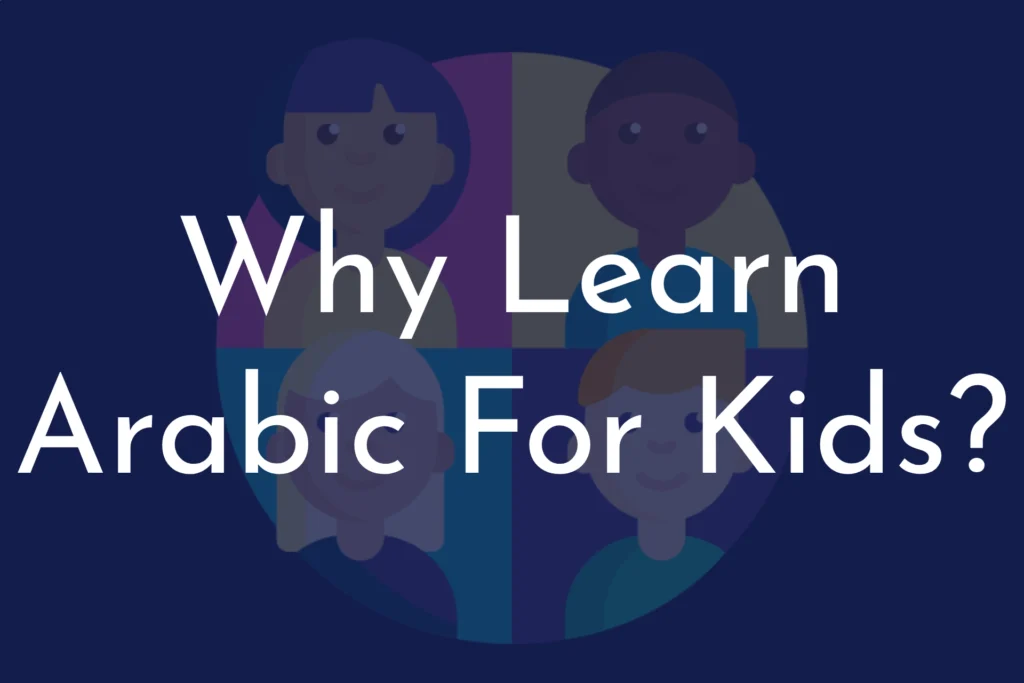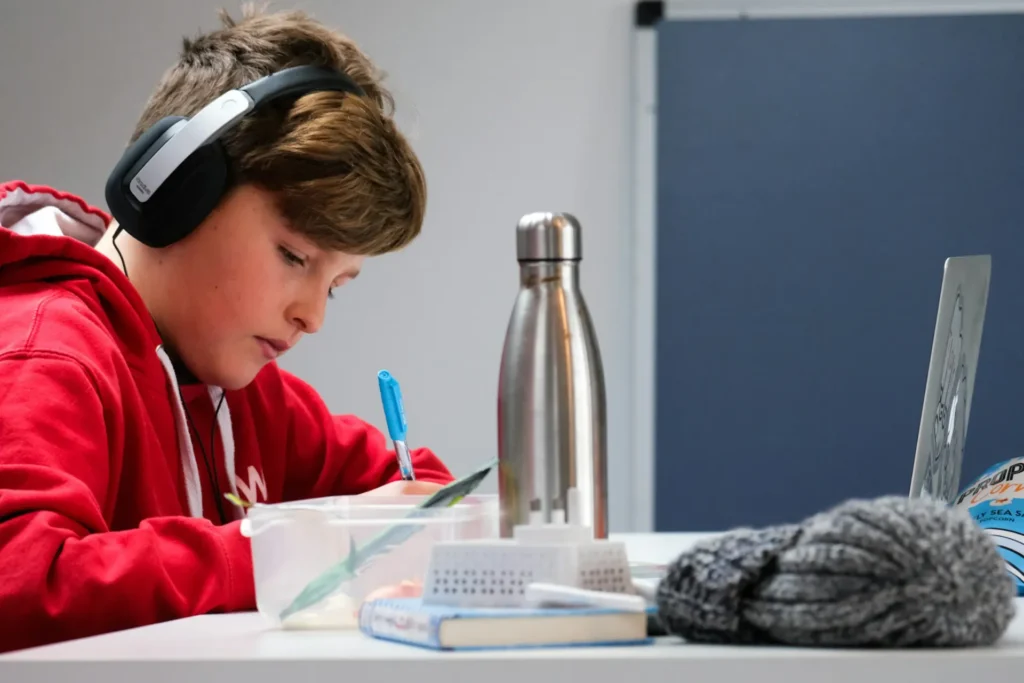When considering additional language studies for your kids, Arabic offers tremendous benefits. In this post, you’ll explore why early exposure to Arabic sets children up for lifelong learning success as well as career advantages in our globalized world.
We will share with you some of the benefits of learning Arabic for kids, some of the challenges they might face, and some of the best tips to make their Arabic learning journey easier and more fun.
But why Arabic? In a world teeming with languages, why should this particular one capture your attention? The reasons are countless, each more compelling than the last. Let’s delve into the enchanting world of Arabic learning for kids and unveil the treasures it holds.
Table of Contents
Why Learn Arabic for Kids?

Arabic is one of the most important and influential languages in the world. It is spoken by more than 400 million people across 22 countries, and it is the official language of the Arab League, the Organization of Islamic Cooperation, and the African Union. It is also one of the six official languages of the United Nations, and one of the most widely used languages on the internet.
Arabic Learning for kids can have many benefits, such as:
- Contrary to common assumptions, children’s minds are supremely equipped for new language exposure from a very young age. In fact, starting formal instruction between ages 3-7 gives kids powerful advantages over later learners due their sponge-like ability to absorb languages.
- Enhancing their cognitive and academic skills:
Studies have shown that learning a foreign language can improve children’s memory, attention, creativity, problem-solving, and critical thinking skills. It can also boost their reading, writing, and math abilities, and give them an edge in their future education and career.
- Expanding their cultural and global awareness:
Learning Arabic for kids can expose them to a rich and diverse culture, history, and literature. They can learn about the Arab world, its people, traditions, values, and achievements. They can also develop a more positive and respectful attitude towards other cultures and religions, and become more open-minded and tolerant.
- Opening up new opportunities and experiences:
Arabic learning for kids can open up many doors for them in the future. They can travel to different countries, make new friends, communicate with native speakers, and enjoy authentic Arabic media and entertainment. They can also access a wealth of knowledge and information that is only available in Arabic, and pursue various academic and professional fields that require Arabic skills.
Also, you can read our full article about benefits of learning Arabic and get a wider image of the importance of this language.
Best Tips to Make your Kids’ Arabic Learning Journey Easier and More Fun
- Start with the basics: Teach your kids the Arabic alphabet, numbers, colors, and common words and phrases. Use songs, games, flashcards, and posters to make it fun and memorable.
- Expose them to different varieties of Arabic: there are many Arabic dialects, such as Modern Standard Arabic (MSA) and colloquial Arabic. Expose your kids to both MSA and colloquial Arabic, and explain the differences and similarities between them. You can use videos, podcasts, cartoons, and books to introduce them to different accents and expressions.
- Connect Arabic to their interests and goals: Find out what your kids are interested in and passionate about, and use Arabic to explore those topics. For example, if your kids love animals, you can teach them the names of different animals in Arabic, and read stories or watch documentaries about them. You can also help your kids set realistic and achievable goals for their Arabic learning, and celebrate their progress and achievements.
- Incorporate Arabic into your daily routine: Make Arabic a part of your everyday life, and use it as much as possible with your kids. You can use Arabic to greet them, ask them questions, give them instructions, play with them, and praise them. You can also label objects around the house with Arabic words, and use Arabic calendars, clocks, and charts to teach them about time, dates, and seasons.
- Be positive and supportive: Learning a new language can be challenging, especially for young children. Be positive and supportive of your kids’ efforts and mistakes, and encourage them to keep trying and learning. Praise their strengths and achievements, and help them overcome their difficulties and frustrations. Show them that you are proud of them and that you enjoy learning Arabic with them.
How to Learn Arabic for Kids?

Learning Arabic for kids can be challenging, but also rewarding and fun. Arabic is a complex and beautiful language, with a unique script, grammar, and vocabulary. It also has many varieties and dialects, which can differ significantly from the standard or classical Arabic. However, Arabic learning for kids does not have to be boring or difficult. With the right method, materials, and motivation, children can learn Arabic in a natural and enjoyable way, just like they learned their mother tongue.
One of the best ways to learn Arabic for kids is to enroll them in an online Arabic class for kids. Online classes offer many advantages over traditional classroom settings, such as:
- Flexibility: You can choose the time and place that works best for you and your child. You can also adjust the pace and frequency of the lessons according to your child’s needs and progress.
- Personalization: You can find a qualified and experienced teacher who can tailor the curriculum and teaching methods to your child’s goals and interests. You can also interact with the teacher and get instant feedback and support.
- Engagement: You can use a variety of online tools and resources, such as videos, games, stories, and quizzes, to make learning fun and interactive for your child. You can also connect with other learners and teachers from different countries and cultures, and exchange ideas and experiences.
What to Expect from an Online Arabic Class for Kids?
– Learning Arabic through communication:
An Arabic for Kids course should focus on developing the four language skills: listening, speaking, reading, and writing. It should be using a communicative approach, which means teaching Arabic through meaningful and interactive activities, such as games, stories, and dialogues. Also, it should use real-life situations and topics that are relevant and interesting for kids, such as family, school, hobbies, animals, and colors.
– Learning Arabic through immersion:
An Arabic for Kids course should immerse children in the Arabic language and culture, by exposing them to authentic and varied Arabic input, such as audio, video, images, and texts. It also should be taught by native and qualified Arabic teachers, who speak Arabic as their first language, and who are trained and experienced in teaching Arabic to children online. It should use Arabic as the main language of instruction, and only use English when necessary, to create a natural and immersive Arabic learning environment.
– Learning Arabic at their own pace and level:
An Arabic for Kids course should adapt to the needs and abilities of each child, by offering different levels and courses, from beginner to advanced, and from general to specific. It also should customize the lessons and the materials (like Arabic books for kids) according to the age, interests, goals, and learning style of each child. In addition, it should provide feedback and support to help them progress and improve their Arabic skills.
What Challenges That Might Face Your Kids When Learning Arabic?

Learning Arabic can also pose some challenges. Some of the common difficulties that kids might encounter when learning Arabic are:
- The Arabic writing, script and sound system: Arabic has a different writing system and alphabet than most European languages, and some of the letters and sounds can be hard to distinguish or pronounce for non-native speakers. Arabic also has some sounds that do not exist in English, such as the emphatic consonants and the glottal stop.
- Arabic grammar and vocabulary: Arabic has a complex and rich grammar that can be challenging to master, especially for beginners. Arabic has many rules and exceptions for word formation, gender, number, case, and verb conjugation. For example, Arabic nouns can have three cases: nominative, accusative, and genitive, and each case can have a different ending depending on the gender and number of the noun. Arabic also has a large and diverse vocabulary that can vary depending on the dialect, region, and context. For example, Arabic has more than 10 words for camel, and more than 100 words for lion.
- The Arabic dialects and varieties: Arabic is not a single language, but a family of languages that have different forms and levels of mutual intelligibility. There are two main varieties of Arabic: Modern Standard Arabic (MSA) and colloquial Arabic. MSA is the official and literary form of Arabic that is used in media, education, and formal settings. Colloquial Arabic is the spoken form of Arabic that is used in everyday communication and varies from country to country, and sometimes from city to city. For example, the word for “much” in MSA is “كثير”, but in Egyptian Arabic it is “كتير”, and in Moroccan Arabic it is “بزّاف”. Learning Arabic can require exposure and adaptation to both MSA and colloquial Arabic, depending on the purpose and context of the communication.
These are some of the main challenges that kids might face when learning Arabic, but they are not insurmountable. With the right method, teacher, and motivation, kids can overcome these difficulties and enjoy the benefits of learning Arabic.
Conclusion: Embrace the Journey of Arabic Learning for Kids
Learning Arabic opens doors to new opportunities and connections. Learning Arabic for kids can be a fun and effective way to introduce your child to a new language and culture. It can also give them a head start in their academic and professional future. By enrolling your child in an online Arabic class for kids, you can ensure that they get the best possible learning experience, with flexibility, personalization, engagement, and affordability.
Don’t miss out on the chance to provide your child with a valuable skill and a deeper understanding of the world. Check our online Arabic classes for kids today, enroll and watch your child blossom in a world of language and culture.

